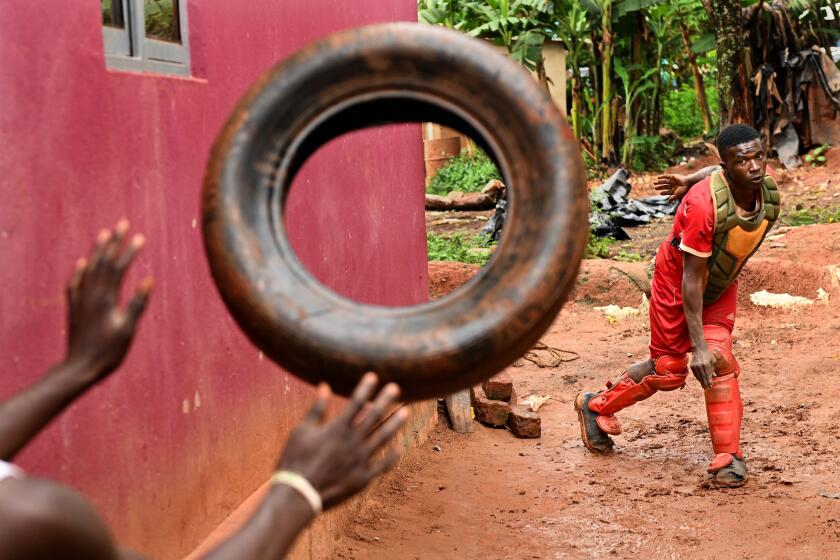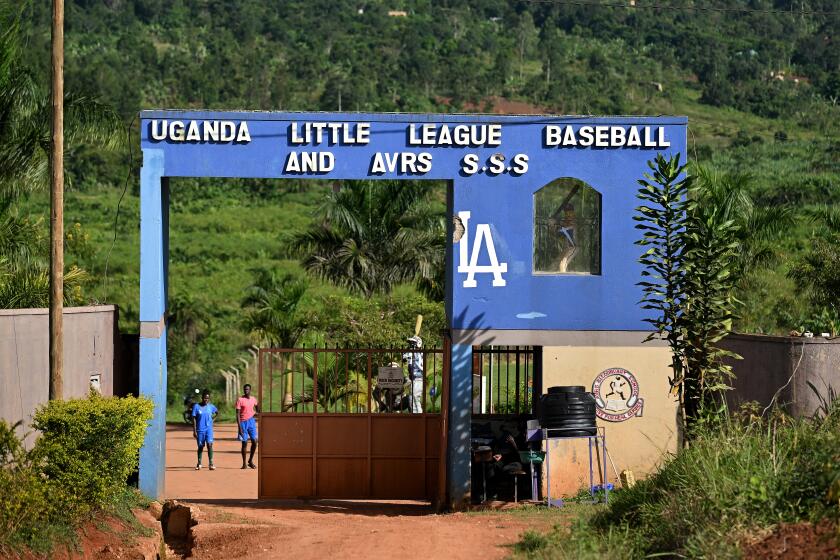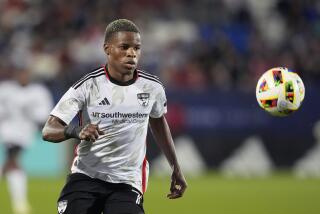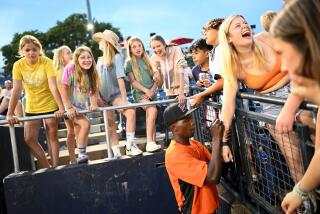Ugandan major league hopeful finally gets visa to play in MLB Draft League
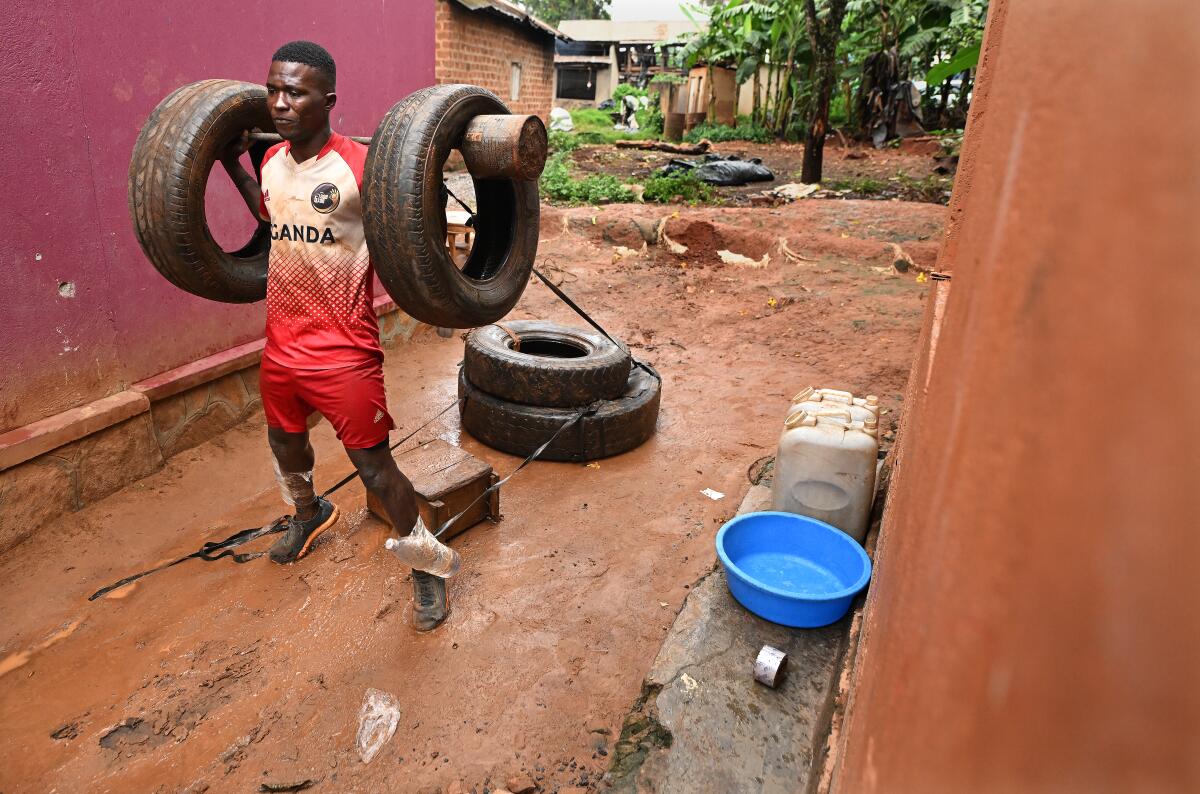
- Share via
After declining to issue a travel visa to Dennis Kasumba, the Ugandan orphan profiled in The Times, the American Embassy in Kampala backtracked Thursday and approved Kasumba’s request to travel to the U.S. this month to play in the MLB Draft League.
“I’m very happy,” Kasumba said after leaving the embassy. “I’m very excited.”
Kasumba, 18, had been denied a U.S. visa three times because he had been unable to prove he had close family ties that would compel him to return to Uganda. That proved tough since the teenager never knew his father, and his mother abandoned him when he was 2 months old.
But two stories in The Times detailing Kasumba’s poverty and his dedication to baseball caught the attention of people at the highest levels of the Uganda government, who intervened strongly on the player’s behalf, according to Joshua Williams, an Atlanta attorney with Taylor English Duma who is working with Kasumba. A series of weekend conversations involving government officials and U.S. State Department personnel resulted in Kasumba’s situation being reconsidered.
A key hurdle was cleared when the Uganda government, citing Kasumba’s status with the country’s national team, offered assurances he wouldn’t overstay his visa in the U.S.
Orphaned at a young age and living in poverty and despair, Dennis Kasumba has found purpose in pursuing his dream to become Uganda’s first MLB player.
Major League Baseball and several NGOs working in Uganda were also involved, said Williams.
Kasumba is expected to arrive in the U.S. later this month. A catcher, he has been invited to play with the Frederick Keys in the MLB Draft League, a six-team amateur summer league that opens its 30-game season June 1. The team, based in Frederick, Md., is managed by René Rivera, who was a catcher for the Angels and 10 other major league teams during his 17-year professional career.
Kasumba is facing incredibly long odds to become the first major leaguer from Uganda, a country of 46 million, just 2,500 of whom are estimated to be playing baseball. Not only has no Ugandan played in the majors, no one from the country had even played minor league baseball until last year when the Dodgers signed Ben Serunkuma, a 21-year-old relief pitcher, and Umar Male, a 21-year-old outfielder. This winter the Pittsburgh Pirates signed pitcher David Matoma, a 17-year-old right-hander.
In an effort to overcome those odds, Kasumba, who can’t afford a gym membership, has developed a creative — and exhausting — series of exercises using, among other things, a stack of old tires, plastic bottles filled with water and a weathered blue backpack stuffed with rocks. The workouts, performed on a narrow stretch of mud outside the house he shares with his grandmother and six others, are often recorded by his sister on a cellphone and posted on social media, where Kasumba’s determination has made him an internet sensation with tens of thousands of followers.
“I’m working hard because I have an aim to become an MLB player,” he said.
It was Paul Wafula and Ssempa Johnbosco, volunteer coaches in the dusty crossroads town of Gayaza, who introduced Kasumba to baseball. At 14, Kasumba was working in a slaughterhouse to earn enough money for one meal a day when Wafula, who had pitched and played the outfield for a semipro team in Japan and with the Ugandan national team, promised to feed him if he would come to baseball practice. He later sweetened the offer if the boy agreed to go back to school as well.
The Dodgers are running a baseball academy in central Uganda that few people outside the country know about, and it’s starting to turn out pro players.
“His life was a mess,” said Wafula, whose team includes five other orphans.
One in nine children in Uganda is orphaned, and Wafula’s work with Kasumba and the others, which was also detailed in The Times’ stories, has led to plans to build a residential facility with a baseball field for Wafula’s orphaned players.
“If you don’t have hope, why do you even get up in the morning?” asked Wafula, who shared a one-room house with seven family members in a slum so notorious it has since been demolished. “If you don’t have hope, you don’t have anything.”
In Kasumba’s case he now has more than just hope. He also has a visa.
More to Read
Go beyond the scoreboard
Get the latest on L.A.'s teams in the daily Sports Report newsletter.
You may occasionally receive promotional content from the Los Angeles Times.

